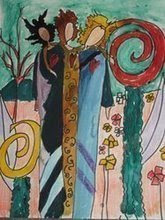A number of years ago Craig was approached by a small commercial venture seeking business advice. Nothing unusual in that - he often acts as a business consultant. The difference was that this was a fair trade venture. To cut an incredibly long story short Craig became very cynical about the ethics of the fair trade movement, what really exists beneath the surface and the business models of many of the large fairtrade businesses in our country. The small commercial venture veered away from fairtrade towards 'main stream' trade which surprised me immensely as the founder of the enterprise had worked with a hardcore free trade organisation for over ten years.
Over the past few years fairtrade has occasionally come up in conversation and Craig's view hasn't changed. I didn't necessarily agree with him and have continued where possible (availability and price permitting) to buy fairly traded products.
Last night Hermione, Craig and I braved the driving rain and headed off to a fairtrade event. I suspect there will be events on in many cities as it is Fairtrade Fortnight. The event was essentially run by the marketing manager (or was it director?) of Divine Chocolate. He talked about fairtrade generally, Divine specifically and the increasing success of fairtrade. He had with him a farmer from Ghana who with the help of a slide show explained the process by which cocoa is grown, harvested, and processed.
The information about the cocoa farms, harvesting and processing was very interesting. What also interested me was Divine's business model. I suddenly had a 'lights on' moment and saw one of the gross injustices of some fairtrade business models.
The cocoa is bought from the farmers in a crude state and they are given a percentage of that price. The cocoa then progresses up the supply chain where it undergoes various processes to turn it into chocolate, wrap it, pack it etc. Although all of these businesses are proud to be involved in a fairtrade industry not one of them gives anything back to the farmers. They all add value to the product and add to their own coffers - but not the farmers. The chocolate finally reaches Divine where it is sold on for retail. The profits Divine make are in part (less than 50%) reinvested in the farming co-operative - the rest of the profits go to Divine shareholders, not fairtrade farmers. The biggest uplift in product value is at the retail end - again fairtrade farmers don't see a penny of this.
I stand to be corrected in my understanding of the above business model - but this is how I see it right now - and I'm not impressed.
There are lots of retailers out there who bang their drum about supporting fair trade but what are they really giving back? Anything? Nothing? Okay, by bringing the product to the consumer they are supporting a supply chain which sees fairtrade farmers reap a small benefit, but that's it. They're not giving anything in a financial sense are they?
What's the solution? I don't know. A lot of people are put off from buying fair trade because of the price premium. Perhaps one possible solution would be if retailers were to cut their profit margin to a level by which fairtrade could compete on an even playing field as regard to retail price. This wouldn't increase the per unit profit to the fairtrade farmers but could possibly increase the through put as demand could grow amongst consumers if they didn't have to pay a premium.
As you can probably tell I'm not hugely knowledgeable about this and would welcome input from anyone who has any thoughts. I guess I'm just at that stage of scratching my head and thinking that perhaps there is a whole lot more to this than meets the eye. Perhaps it's just not as fair as some would like us to believe and may be there are ways in which it could be made much fairer (in an ideal world that is).
It was an interesting evening. We enjoyed the chocolate samples and sitting in an Italian restaurant, (check out your local Pizza Express they currently have a two for one deal on), discussing fairtrade ethics over a delicious pizza, I had a smug home ed moment knowing we possibly wouldn't have the flexibility to do such things if we had made different life choices.
Summer Speed
2 years ago








9 comments:
Hi, Divine is one of the top Fair Trade organizations in the world. They are 100% Fair Trade in everything they do which means they apply the 10 principles of fair Trade to their business practice (not just the purchasing deals). Divine has direct relationship with farmers, it doesn't just buy from them, it is a partner and advises and reinvests - above and beyond the Fairtrade criteria. 48% of Divine's shareholders are farmers, that's the business model, the farmers get the best deal going from Divine. In the USA Divine has been launched by SERRV that is one of the oldest FTOs Fair Trade Organizations in the world going bak to the refugee crisis of WWII.
I don't work with Divine but I know their reputation is second to none ad they are a model business. Check out http://www.wfto.com/ or http://www.worldfairtradeday09.org/ if you'd like to understand the difference between a fairtrade product and a Fair Trade Organization
smug home ed moments are the best :0)
I hear what you are saying but I don't think that changes the fact fairtrade isn't always quite as fair as the consumer envisages.
Hello I'm a new reader. I recognised your daughter at the Tempest the other day :-)
I've wondered for a while whether fairtrade is all it claims to be. It still puts food on our supermarket shelves enabling us to live our rich western lifestyles compared to those of the farmers who grow it.
It is probably better than non fairtrade stuff though, leaving farmer's children hungry or even worse selling them into slavery. My dh won't buy any non fairtrade chocolate at all because of the slavery issue.
I'm not sure what the answer is other than a huge revolution of the way we all live. Makes me think enough to stop grumbling about my perceived poverty as part of a one salary family of six - we may not go abroad every year but we have everything we need compared with those chocolate or coffee farmers.
Hazel
Hello Hazel. Thanks for stopping by and commenting. I've just popped over to your blog and it's lovely to see so many familiar places :-)
Hermione went to the Tempest with her Nana and I stayed home with Miles - but perhaps we have met elsewhere? There was a time when I felt that I knew most local home ed families but there seems to be so many of us now that I'm loosing touch :-) It is certainly a good thing though (the increase in numbers) as more and more trips and special interest clubs become viable.
I agree that fairtrade stuff is a better deal for farmers than non fairtrade. I suppose I just feel a little disapointed at the realisation that they are not benefiting to the extent I thought they were.
We've been very skeptical from the start, and don't actually buy fairtrade. I rather spend the extra money on organic food products instead.
Love those 'proud' HE moments as well!
I thought the principal with Fairtrade was that the farmer got a fair price for their product and that's what I see has happened here. Ok, it's not ideal but better than some of the ways that big supermarkets work.
Yes, it's better than some - but could be even better I think :-)
OT from your post but this reminds me of the time I joined a local veg box scheme to reduce my food miles and received tomatoes from Argentina in it!
Post a Comment